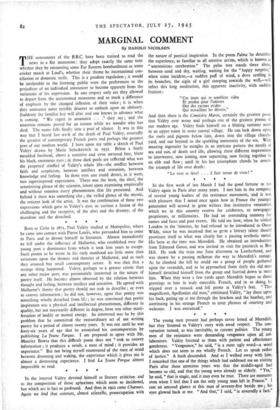In the interval Valery devoted himself to literary criticism and
to the composition of those aphorisms which seem so incidental, but which are in fact so profound. And then in 1922 came Charmes. Again we find that constant, almost scientific, preoccupation with the nature of poetical inspiration. In the poem Palme he describes the experience, so familiar to all creative art:sts, which is known as " unconsicous cerebration." The palm tree stands there alone, between sand and sky, waiting, waiting for the "happy surprise," when some incident,—a sudden puff of wind, a dove settling in its branches, the sight of a girl stooping towards the well,—will infect this long meditation, this apparent inactivity, with sudden fruition: "Ces jours qui to semblent vides Et perdus pour l'univers Ont des racines avides Qui travaillent les deserts."
And then there is the Cimitiere Marin, certainly the greatest poem that Valery ever wrote and perhaps one of the greatest poems of our modern age. Valery finds himself on a blazing summer noon in an upper room in some coastal village. He can look down upon the roofs and pigeons below him, down into the village church- yard, and out beyond to the sparkling immensity of the sea. With amazing ingenuity he mingles in an intricate pattern the motifs of sea and sun, of death and life, allowing these different impressions to interweave, now joining, now separating, now fusing together in
an ebb and flow ; until in his last triumphant chords he asserts the triumph of life over death: "Le vent se level . . . it faut tenter de vivre! "


























 Previous page
Previous page